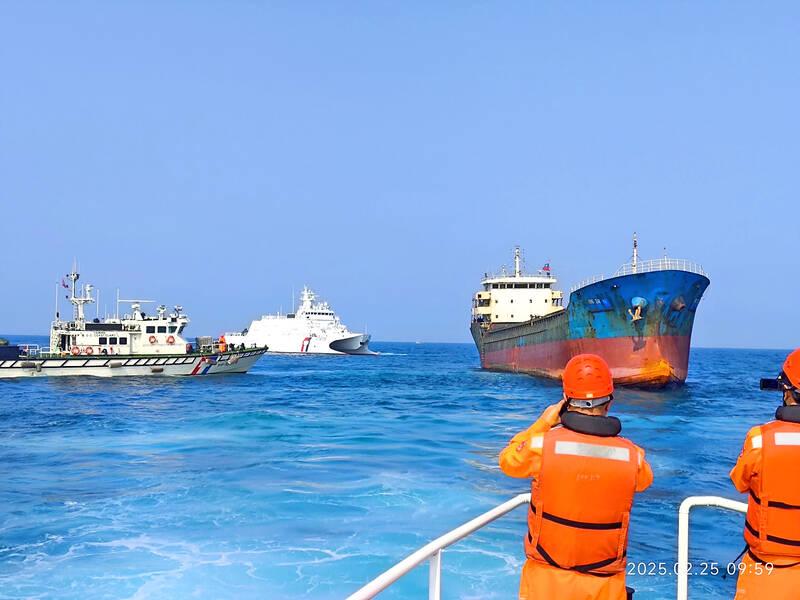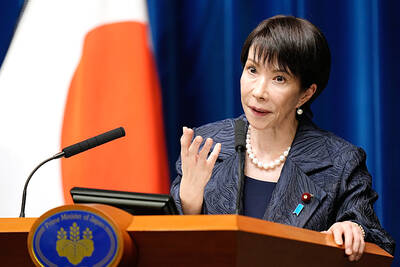Several US senators proposed the "Strategic Subsea Cables Act of 2025" on Monday to spur US government engagement related to the security, installation and maintenance, and repair of undersea fiber-optic cables.
One of those proposing the bill, ranking Senate Foreign Relations Committee member Jeanne Shaheen, referred to fiber-optic cables as "strategic" and "critical infrastructure" that "form the bedrock of global Internet traffic," a committee statement said.

Photo courtesy of the Coast Guard Administration
The US must respond to the rise of cable cuts in the Baltic Sea and the Taiwan Strait, she said in a committee news release.
Another of the bill's sponsors, Republican John Barrasso, echoed Shaheen's views, saying that adversaries such as China and Russia continue to target the cables to "disrupt communications in Taiwan and for our allies across Europe and the Middle East."
Because of that, the US should ensure that the vital telecommunications infrastructure is safeguarded from "terrorist threats," Barrasso said.
The bill calls for greater US participation in international bodies such as the International Cable Protection Committee and increased US Department of State investment, including hiring at least two full-time staff dedicated to the effort.
It would require the US president to impose sanctions against foreign people who intentionally damage undersea cables and establish an inter-agency committee to coordinate related efforts.
It would also mandate a federal strategy to work with industry partners and require federal agencies to develop procedures to ensure timely communication of threat information with private undersea cable operators.
Undersea cables connected to Taiwan have faced ongoing disruptions in recent years.
The National Security Bureau in September said that about seven to eight undersea cable breaks occurred around Taiwan over the past three years, with four occurring within two months of the beginning of this year.
A Chinese captain was found responsible for one of the aforementioned incidents in June.

The Ministry of Foreign Affairs (MOFA) yesterday voiced dissatisfaction with the Comprehensive and Progressive Agreement for Trans- Pacific Partnership (CPTPP), whose latest meeting, concluded earlier the same day, appeared not to address the country’s application. In a statement, MOFA said the CPTPP commission had "once again failed to fairly process Taiwan’s application," attributing the inaction to the bloc’s "succumbing to political pressure," without elaborating. Taiwan submitted its CPTPP application under the name "Separate Customs Territory of Taiwan, Penghu, Kinmen and Matsu" on Sept. 22, 2021 -- less than a week after China

THE GOOD WORD: More than 100 colleges on both sides of the Pacific will work together to bring students to Taiwan so they can learn Mandarin where it is spoken A total of 102 universities from Taiwan and the US are collaborating in a push to promote Taiwan as the first-choice place to learn Mandarin, with seven Mandarin learning centers stood up in the US to train and support teachers, the Foundation for International Cooperation in Higher Education of Taiwan (FICHET) said. At the annual convention of the American Council on the Teaching of Foreign Languages held over the weekend in New Orleans, Louisiana, a Taiwan Pavilion was jointly run by 17 representative teams from the FICHET, the Overseas Community Affairs Council, the Steering Committee for the Test of Proficiency-Huayu, the

A home-style restaurant opened by a Taiwanese woman in Quezon City in Metro Manila has been featured in the first-ever Michelin Guide honoring exceptional restaurants in the Philippines. The restaurant, Fong Wei Wu (豐味屋), was one of 74 eateries to receive a “Michelin Selected” honor in the guide, while one restaurant received two Michelin stars, eight received one star and 25 were awarded a “Bib Gourmand.” The guide, which was limited to restaurants in Metro Manila and Cebu, was published on Oct. 30. In an interview, Feng Wei Wu’s owner and chef, Linda, said that as a restaurateur in her 60s, receiving an

MORE RETALIATION: China would adopt a long-term pressure strategy to prevent other countries or future prime ministers following in Sanae Takaichi’s steps, an academic said Taiwan should maintain communications with Japan, as Japanese Prime Minister Sanae Takaichi is to lead a revision of security documents, Taiwanese academics said yesterday. Tensions have risen between Japan and China over remarks by Takaichi earlier this month that the use of force against Taiwan would constitute a “survival-threatening situation” for Japan. Prospect Foundation president Lai I-chung (賴怡忠) yesterday said Takaichi’s stance regarding Taiwan is the same as past Japanese prime ministers, but her position is clearer than that of her predecessors Fumio Kishida and Shigeru Ishiba. Although Japan views a “Taiwan contingency” as a “survival-threatening situation,” which would allow its military to